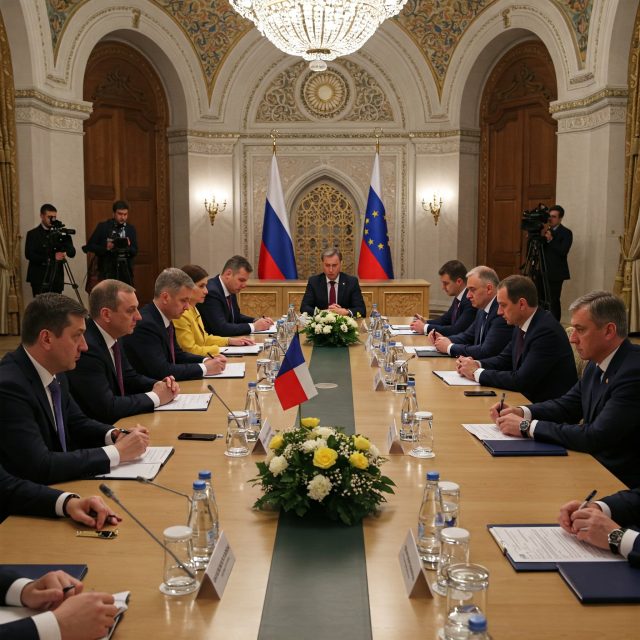Renewed Hopes and Lingering Tensions: Ukraine-Russia Talks Convene Again in Turkey
Amidst the ongoing conflict, diplomatic efforts to find a peaceful resolution between Ukraine and Russia have once again turned to Turkey, with new talks reportedly commencing or being proposed in Istanbul today. This development marks a potential “restart” of negotiations, following earlier rounds hosted by Ankara, and comes at a critical juncture in the protracted war.
Ukrainian President Volodymyr Zelenskyy has arrived in Turkey for these discussions. However, Russian President Vladimir Putin is not expected to attend, with reports suggesting Russia will be represented by a delegation that some European powers have criticized as “low-level.” There remains some uncertainty regarding the exact timing and confirmation of the direct talks, with a Ukrainian official reportedly stating that no firm agreement on the commencement of discussions had been reached, countering earlier Russian state media reports.
The Kremlin has framed these Istanbul talks as a “restart” of the peace negotiations that previously took place in the Turkish city in March 2022. Those initial discussions, occurring shortly after the full-scale invasion, had shown some glimmers of progress.
Echoes of Past Negotiations in Turkey
Turkey, maintaining relations with both Kyiv and Moscow, has consistently positioned itself as a mediator. The March 2022 talks in Istanbul were a significant early attempt to find a diplomatic off-ramp. During those negotiations, a provisional agreement was reportedly discussed. Key elements included Ukraine committing to neutrality and abandoning its ambitions to join NATO, alongside limitations on its military capabilities. In return, Ukraine was to receive security guarantees from several countries. A crucial point of contention, the status of Crimea (annexed by Russia in 2014), was reportedly to be set aside from these immediate terms, with Ukraine not being required to recognize Russian sovereignty.
However, these nascent agreements ultimately faltered. Reports suggest that Russian President Putin later expanded his objectives, leading to the collapse of this particular negotiation track.
The Current Diplomatic Push: Goals and Challenges
The renewed talks in May 2025 come after recent diplomatic overtures. On May 11, 2025, President Putin proposed restarting direct talks in Istanbul “without preconditions.” This followed a meeting on May 10 in Kyiv where French President Emmanuel Macron, British Prime Minister Keir Starmer, German Chancellor Friedrich Merz, and Polish Prime Minister Donald Tusk met with President Zelenskyy, urging Russia to enact a 30-day truce. President Zelenskyy had challenged Putin to meet personally in Turkey, a call that has not been met with Putin’s attendance at the current talks.
The objectives for the current round remain complex:
- For Ukraine: The primary goal remains the restoration of its territorial integrity, the withdrawal of Russian forces, security guarantees, and accountability for alleged war crimes.
- For Russia: Moscow’s aims have included Ukraine’s neutrality, “demilitarization,” “denazification,” and the recognition of territorial realities, including its claims over annexed Ukrainian regions. The absence of preconditions from Putin’s latest proposal will be closely scrutinized for any shifts in Moscow’s stance.
Significant challenges persist. The deep mistrust between the two sides, the maximalist positions often publicly stated, and the ongoing intense fighting on the ground create a difficult environment for negotiations. The composition of the delegations and the level of authority granted to negotiators will also be critical factors.
Turkey’s Enduring Role as Mediator
Turkey’s strategic location and its balanced diplomatic approach, which has seen it condemn the invasion while also not joining Western sanctions wholesale against Russia, have allowed it to play a unique role. President Recep Tayyip Erdoğan has repeatedly offered to host peace talks and has been involved in mediating specific issues, such as the Black Sea Grain Initiative. Ankara’s continued efforts underscore the international desire for a negotiated settlement, even as the prospects for a comprehensive breakthrough remain uncertain.
International Reactions and Outlook
The international community is watching the Istanbul talks with a mixture of hope and skepticism. The presence of President Zelenskyy signifies Ukraine’s willingness to engage, while the level of the Russian delegation has drawn criticism and raised questions about Moscow’s seriousness. NATO and European officials have expressed caution, with some seeing “no indications that Russia wants peace in Ukraine.”
As discussions potentially get underway, the key questions will revolve around whether common ground can be found on any substantive issues, or if these talks will serve more as a channel for communication and exploring the possibility of future, more comprehensive negotiations. The outcomes, or lack thereof, will undoubtedly shape the next phase of the conflict and the broader geopolitical landscape. The path to peace remains fraught with obstacles, but the willingness of both sides to meet in Turkey offers a tentative, albeit fragile, opportunity for diplomacy.


































